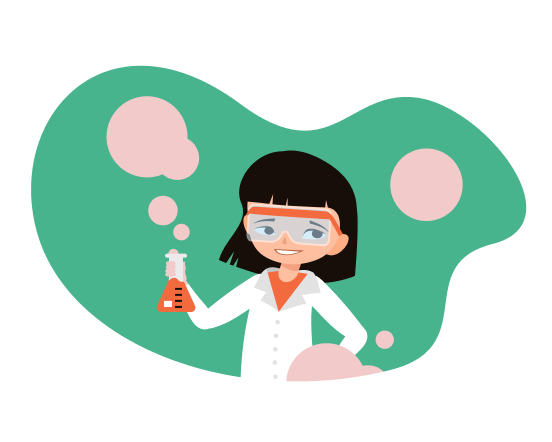
What do scientists do?
Every day the speed of scientific progress is growing faster and faster. Everything that surrounds you right now is somehow connected with science. There is always a massive need for bright researchers in all fields. Scientists improve our present and create our future.
Generally, a scientist is a person who researches and examines our world in order to gather a better understanding of how it works. There are lots of types of scientists, but, as a matter of fact, each of them does the same kind of work — the difference is in the object of research and some methods.
So, what are the primary responsibilities of a scientist?
- to make an observation;
- to plan and conduct experiments;
- to record and analyze data;
- to present results to other research staff;
- to write research papers, reports, reviews, and summaries;
- to demonstrate procedures;
- to supervise junior staff;
- to organize product testing;
- to ensure that quality standards are met;
- to develop original solutions to problems.
Obviously, this approach can vary, but no matter what path a scientist takes, the aim is always the same — to share new knowledge with the extensive scientific community and contribute to future discoveries. One breakthrough leads to another, and this chain can be very long. “If I have seen further, it is by standing on the shoulders of Giants” — Isaac Newton once said about his discoveries.
Where do scientists work?

Where can we meet scientists? Practically, anywhere! Scientists work in companies of every size and approach, helping them to develop a product. Moreover, they frequently work in universities and colleges, doing research and teaching the younger generation. Government is often interested in highly qualified scientists, offering them big grants for their research. Environmental agencies, laboratories, food companies, chemical and pharmaceutical industries are also places for scientists to earn money. There are lots of offers on the Internet, on special resources and career services.
You may also be interested:
Jobs of the future: what will our children do at 25? 10 professions that will be in high demand in the next 1-2 decades and skills that are needed to succeed in them.
Talking more specifically, let’s see what different scientists do.
Chemist
Objects of study are composition, structure, properties of substances, and their reactions. Chemists perform experiments and measure the effects of chemical compounds in various situations. They usually work as a part of a big team. Chemists can be categorized according to their specialization in biochemistry, neurochemistry, nuclear chemistry, or theoretical chemistry.
Biologist
These scientists study living organisms. There is a wide range of objects of study: how an organism first appeared, how it is built, how it grows and functions, what it does, where it lives. Biology is a vast field, and you cannot be an expert in all of it, so there are narrow specializations like microbiology, molecular biology, marine biology, etc.
Cytotechnologist
This professional prepares and examines human cells for the presence of disease. Cytotechnologists play a significant role in medical science — they are so-called “cell detectives”. Their main tool is a microscope that helps them to distinguish normal cells from abnormal ones. These people are a crucial part of fighting diseases that have an impact on our lives.
Geneticist
Genetics is a branch of biology that explores the characteristics of different organisms and how they evaluate through time. The main interest of these scientists is patients with hereditary conditions or congenital malformations.
Geologist
The history, origin, and structure of the earth is an object of geological research. These scientists study earthquakes, landslides, floods, and volcanic eruptions and apply their research results in a practical field such as creating building plans.
Paleontologist
The object of paleontological study is the fossilized remains of different organisms. However, it’s not entirely about the past: paleontologists find connections between today’s plants and animals and their extinct ancestors.
Geographer
When a person is a geographer, he/she studies the earth and its land, features, and inhabitants. Some of these scientists work with political or cultural structures, research physical or human geography. GPS, GIS, and all sorts of maps are their main tools.
Zoologist
It’s a scientist who studies animals in a broad sense. Zoological interest goes from animals’ origins to their behavior. This field is very broad as there are more than a million species identified. You can specialize in any of them.
Animal Scientist
This kind of scientist works in the agricultural and food industry. They work to develop more effective ways of nutrition, production of meat, poultry, eggs, and milk. We can meet animal scientists in private and national food production companies, farms, and labs.
Archaeologist
As most of us know, archaeologists study ancient people and their culture. They discover remains of the past times, rebuilding history step by step. Most of the archaeologists choose to study one specific period, for example, the stone age.
Anthropologist
In the team, alongside archaeologists, we can meet anthropologists. Some aspects of their study are archaeology, linguistics, and biology. In general, anthropologists tend to learn and understand humankind.
Audiologist
Audiology is a narrow specialization of a scientist working in healthcare facilities. They test human hearing ability and treat injuries and disabilities of the ear. Audiologists’ work involves lots of technologies such as computers, audiometers, and other measuring devices.
Physicist
Generally, physicists explore and identify the basic principles that govern the structure and behavior of matter, how energy and matter interact, and how energy is generated and transferred. Obviously, there are many branches, including atomic, biological, chemical, nuclear, polymer, plasma, physics, etc.
Astronomer
It’s a person who studies outer space. Astronomers try to understand how the universe works, what’s going on with the stars, and what will happen to all of it in a long-term perspective. They use telescopes, spectrographs, cameras, spacecraft, and computers to make their observations.
Hydrologist
A hydrologist is someone who studies water and the water cycle. Their goal is to solve problems of water quality and availability. Hydrologists cooperate with engineers, biologists, and public officials, as well.
Atmospheric Scientist
The object of atmospheric studies is the earth’s atmosphere, including climate and weather. In our modern world, with the constant climate change, these scientists’ work is very significant. They often work with a team of other scientists to help them solve problems concerning the climate.
Meteorologist
To begin with, weather forecasts that we see on TV or the Internet are the job of meteorologists. They use scientific methods to observe and explain what impact the earth’s atmosphere has on our lives. Their areas of study go from research to forensic meteorology.
Geospatial Information Scientist
People who decide where to build a new block of flats or how to establish a bridge are Geospatial Information scientists. They study how we use the physical space around us and help to organize it most effectively.
Bioinformatics Scientist
These scientists work on computational means, which help them to store, analyze and explore biological data. They work with many other scientists in order to develop biological databases and structure all the valuable information.
Political Scientist
In this profession, you study the origins and development of different political systems. These scientists research governments, policies, political ideas, and trends. This science divides into four areas: comparative politics, national politics, political theory, and international relations.
What skills does a scientist need?
Talking about education, experience, and skills, requirements for each type of area can vary. Nevertheless, there are some basic steps that are necessary for maintaining a career in science:
- Enroll in science-related courses in undergraduate college.
- Choose a science that interests you the most.
- Get a lab internship to gain empirical experience.
- Complete a graduate degree in the scientific field you want to be your specialization.
- Get a research internship.
- Find a post-doctoral research program.
- Look for a job as a scientist and apply for suitable options.
Talking about education, a Ph.D. is usually required. Any higher degree will be a great benefit. However, don’t forget about practical experience and try to gain it as soon as possible.
Nonetheless, education is not everything. To be a good scientist, you need to have a specific type of character. Natural curiosity is a must-have! Also, you’d better be logical, rational, and analytical. Your mind should be cold and rapid, and your nerves ought to be healthy. Most of the time, you will work in a team, and sometimes you will have to take leadership. At the same time, you don’t have to be robot-like — lots of scientists are very artistic people and consider their work pure creativity.
All in all, scientific work can be backbreaking and demanding. Still, if you are ready to overcome stress and make this world a better place — you will definitely succeed. It is also a gratifying job. Just imagine how flattering it is to be a part of a prestigious scientific community and discover something that no other person could have ever imagined. But to achieve it, you have to do your best!

new engaging articles



